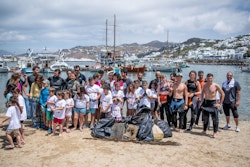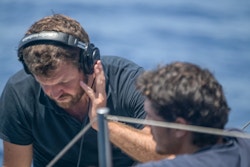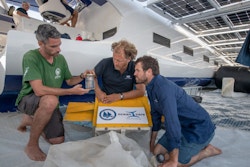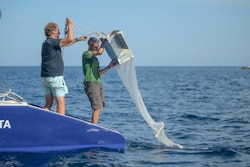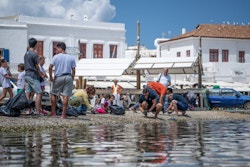The ocean, humanity’ savior?
Intensive fishing, plastic pollution, coastal urbanization, increased sea traffic. The ocean is the largest habitat in the world. Yet today, it is endangered by human activities. And World Oceans Day is the moment we have been waiting to raise awareness of the need for sustainable management of this vital ecosystem.
More than 3,85 billion years ago, the very first living cells appeared. It is from the ocean that biodiversity emerged and from which it then flourished. Today, the ocean is thought be home to be more than 10 million species — except bacteria — that are mostly undocumented. And now we have the opportunity to explore this incredibly rich and diverse world together, this Saturday, June 8, which is World Oceans Day.
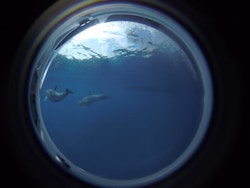
Dolphins swiming next to Energy Observer
Explore, to put an end to the excessive exploitation. Because overfishing is now endangering life itself. Five short minutes of bottom-trawling is enough to erase a thousand years of an ecosystem’s development. It is high time to reconsider our relationship with the ocean.
Biodiversity must take its place at the center of the issues we face. Marine protected areas must be managed more effectively. Regulations must be implemented to curb overfishing in order to allow the oceans to regenerate. All with the objective of a better knowledge of underwater life. Some people have understood that. In their odyssey for the future, Energy Observer’s crew have met them. Archipelagos’ volunteers, for example, who are committed to defending biodiversity in the seas around Greece, or those at All For Blue, who are dedicated to increasing shark numbers and reducing marine litter.
A struggle that comes face to face with the problems of marine pollution. Plastic pollution, in particular. Every year, 13 million tons of plastic are thrown into the water. If this trend continues, by 2050 there could be more plastics in our oceans than fish. But we hold in our hands the power to make a difference. By simply reducing our use of disposable plastic, for example.
Today, protecting the oceans appears is all the more important today because all these attacks on biodiversity are affecting our climate. Productivity of phytoplankton, for example, is slowing down. But phytoplankton is essential to life. It is the first link in the food chain. It also the phytoplankton that absorbs part of the atmosphere’s CO2and turns it into oxygen, which allows the ocean, together with the large forests, to act as one of Earth’s lungs.
But its absorption capacity should not be overestimated. The ocean could even provide us with the means to avoid a catastrophe by offering us an inexhaustible source of clean energy. Renewable sources of energy, that must be taken advantage of with full consideration of the ecosystem. As does Energy Observer, which takes advantage of energy available at sea from the wind and the sun, all the while ensuring zero noise pollution, to avoid disturbing wildlife.
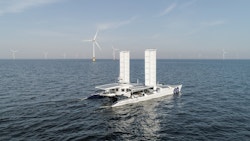
Or, as suggested by Eco Wave Power’s engineers, that the crew met during their journey. They produce green electricity thanks to floats which, lifted by the waves, activate an arm whose piston movement makes it possible to turn a turbine. Installed in Gibraltar, their power plant was first in Europe to provide wave energy to the grid from June 2016.
